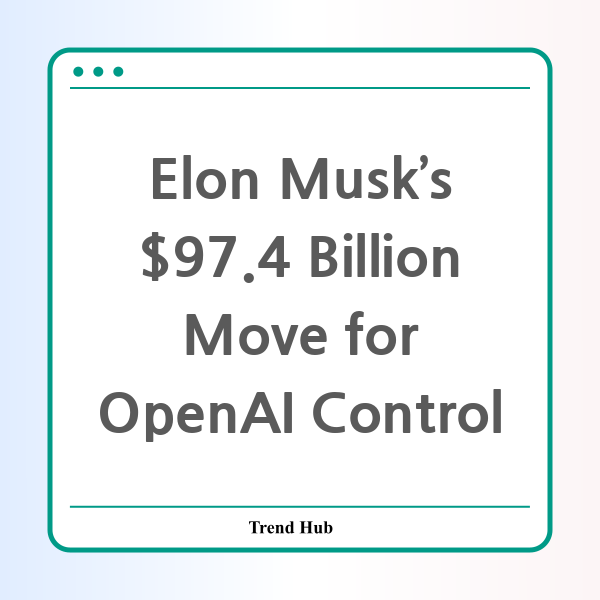* This website participates in the Amazon Affiliate Program and earns from qualifying purchases.

Could a $97.4 billion bid by Elon Musk and a group of investors transform the landscape of artificial intelligence? This monumental offer has sent shockwaves through the tech industry, reigniting discussions about the future of AI leadership and innovation.
According to recent reports, Musk's legal team has officially submitted their bid to take control of OpenAI, the nonprofit that oversees one of the most advanced AI research entities globally. The implications of this move are vast, especially considering Musk's own background as a co-founder of OpenAI in 2015, where he initially helped establish it as a nonprofit dedicated to safe AI research.
But why the sudden interest in regaining control over OpenAI? Musk's statement highlights a critical shift in vision: "It’s time for OpenAI to return to the open-source, safety-focused force for good it once was.” This reflects a growing concern among tech leaders about the trajectory and commercialization of AI technologies.
Since its inception, OpenAI has evolved significantly, especially with the launch of ChatGPT in 2022, which has catalyzed massive investments across the sector. Currently, OpenAI is valued at an astonishing $260 billion following a recent $40 billion investment, underscoring the huge growth potential in AI.
Musk’s bid is not just about acquisition; it represents a broader battle over the future of AI. His competitor, xAI, which he founded recently, is also in the mix, possibly hinting at a strategic merger that could reshape the industry. This development puts Musk in direct competition with OpenAI, leading to a tense legal and public relations battle with current OpenAI CEO Sam Altman.
In the midst of this rivalry, Musk has thrown some verbal jabs on social media, showcasing the personal and professional clashes between the two tech moguls. Altman has rebuffed Musk's approach with a light-hearted retort suggesting a counter-offer to buy Twitter instead, demonstrating the competitive nature inherent in this situation.
The motivations behind Musk's $97.4 billion offer reflect not just a desire for control but also a push towards re-establishing OpenAI's foundational principles. With advancements in AI presenting both exciting opportunities and significant ethical dilemmas, the ongoing discussions about leadership and vision in this space are more critical than ever.
As this saga unfolds, it will be fascinating to see how OpenAI navigates its future—whether it will remain a beacon of open-source innovation or pivot towards a profit-driven model under new leadership. Investors, tech enthusiasts, and AI advocates alike are watching closely, eager to see the impact of these strategic moves on the broader tech landscape.
In conclusion, Elon Musk’s bold offer could potentially shift the dynamics within AI research and development. The outcome of this bid may well define the future direction of OpenAI and its approach to safe and transparent AI advancement. As the tech world continues to evolve, the stakes have never been higher for those at the forefront of innovation.
* This website participates in the Amazon Affiliate Program and earns from qualifying purchases.